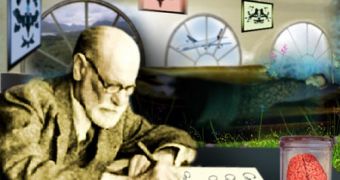It's in vogue to go to the shrink. You see it everywhere: everybody does it and many movies have a psychoanalytical plot. But what it's all about?
The desire is the impulse for initiating our actions. If satisfied, it causes welfare. But if the desires are not accomplished, they can cause trauma. Psychoanalysis says that our unconscious ignores these frustrations caused by unaccomplished desires, because otherwise we would live in a continuous anxiety.
This protective barrier was called repression by Freud. If repression does not work, we will remember what caused the trauma and we won't be able to defend ourselves against its symptoms. The psychoanalysis discovers the traumas in the patient, errors and obsessions from the past, repressed or forgotten (from pragmatism or because we did not accord them their importance), and the reasons for repression and other defensive mechanisms which impede the traumas to emerge.
Then, on a conscious way, behaviors for eliminating the symptoms (phobias, anxiety, depression and others) will be developed.
The psychoanalyst will talk to the patient for determining which type of intervention must be applied. During the sessions, normally of one hour and once a week, the patient counts all that is passing through his/her mind. The specialist (having the technical and personal skills to extract the unconscious data from the consciousness of the patient) gathers these data and elaborates a working plan.
The patient, after finding the hidden causes of his/her problem, intervenes in the recuperation process. Other theories, like the 'conductist' hypothesis, do not believe in a "black box" of our past and search for therapeutic results, starting from the present and conscious side.
Psychoanalysis is the science of unfolding the unconscious, for rebuilding the personality of the individual. Freud found that, if a person is capable of admitting these unconscious contents, this could make the symptoms impacting the psychological welfare disappear, but this is difficult to achieve, as usually the patient opposes. That's why the psychoanalyst must have a mechanism for defending these brakes and the patient must collaborate without suspicion and fear, being sincere and honest. The counted facts must be real. The patient is protagonist of its own curing process and must convert in the master of the therapeutic situation.
During the sessions, a very sensitive material is used: cornered memories, apparently overcome dramas, obsessions, complexes, frustrating family relations, childhood traumas and others. This can produce tough and painful situations.
Starting from the symptoms and the interpretations facilitated by the psychoanalyst, the patient starts discovering him/herself, harmonizing with him/herself and finding the way to improve his/her personality. Discovering the unconscious relieves the symptoms, allowing a profound change of the individual, who discovered he/she had been having a life remote of his/ her own necessities, objectives, desires, and preferences, helping him/her take decisions to become a better person. The repressed information of our past can relieve us, deliver inner peace and help us understand certain episodes of our lives and present problems.
The psychoanalyst must use a simple and accessible speech. The patient should even solicit information on the methods and the content of the therapy.
Patience is required during the psychoanalytic treatment. During the first sessions, the progress is very rapid, and the sessions are even enjoyable, because hidden but admissible traumas are discovered. But solving the issues requires going deeper and perhaps, freeing and tackling memories or traumas which we would prefer not to talk about.
Psychoanalysis is a good thing if it is useful for the individual appealing to it. Specialists cannot clearly say if it is better to feel good and then to look for the causes, or to know the profound causes of our discontent to solve our problems. Some say that first the severe issues must be solved, and then, when we are already optimistic and settled, we can search for the help of the psychoanalyst. The human being aspires for functioning autonomously. That's why the psychoanalyst must be an occasional resource for solving a problem, and not a habit.

 14 DAY TRIAL //
14 DAY TRIAL //